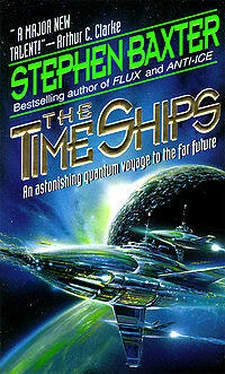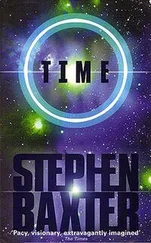I remembered Hyde Park as a civilized place: attractive and calm, with its wide walkways and its scattering of trees. Some of the features I had known were still there — I recognized the copper-green cupola of the Bandstand, where I could hear a choir of Welsh miners singing hymns in gusty unison — but this version of the Park was a place of shadows, broken by islands of illumination around lamp-standards. The grass was gone — dead, no doubt, as soon as the sun was occluded — and much of the bare earth had been covered with sheets of timber. I asked Wallis why the Park had not simply been given over to concrete; he gave me to understand that Londoners liked to believe that one day the ugly Dome over their city could safely be demolished, and their home restored to the beauty it had once known — Parks and all.
One part of the Park, near the Bandstand, had been given over to a sort of shanty-town. There were tents, hundreds of them, clustered around crude concrete buildings which turned out to be communal kitchens and bath-houses. Adults, children and dogs picked across the dry, hard-trodden ground between the tents, making their way through the endless, dull processes of living.
“Poor old London has soaked up a lot of refugees in recent years,” Wallis explained. “The population density is so much higher than it was… and yet there’s useful work for them all. They do suffer in those tents, though — and yet there’s nowhere else to keep them.”
Now we cut off Lancaster Walk and approached the Round Pond at the heart of the Park. This had once been an attractive, uncluttered feature, offering a fine view of Kensington Palace. The Pond was still there, but fenced off; Wallis told me it served as a reservoir to serve the needs of the increased populace. And of the Palace there was only a shell, evidently bombed-out and abandoned.
We stopped at a stand, and were served rather warm lemonade. The crowds milled about, some on bicycles. There was a game of football going on in one corner, with gas-masks piled up to serve as posts; I even heard speckles of laughter. Wallis told me that people would still turn out to the Speakers’ Corner, to hear the Salvation Army, the National Secular Society, the Catholic Evidence Guild, the Anti-Fifth Column League (who waged a campaign against spies, traitors and anyone who might give comfort to the enemy), and so forth.
This was the happiest I had seen people in this benighted time; save for the universal epaulets and masks — and the deadness of the ground beneath, and that awful, looming Roof over all our heads — this might have been a Bank Holiday crowd from any age, and I was struck again by the resilience of the human spirit.
To the north of the Round Pond rows of dingy canvas deck-chairs had been set out, for the use of those wishing to view the news projected on the roof above us. The chairs were mostly occupied; Wallis paid an attendant — the coins were metal tokens, much smaller than the currency of my day — and we settled in two seats with our heads tipped back.
Our silent soldier-attendants moved into place around us, watching us and the crowd.
Dusty fingers of light reached up from Aldis lamps situated (Wallis said) in Portland Place, and splashed gray and white tones across the roof. Amplified voices and music washed down over the passive crowd. The Roof had been white-washed hereabouts and so the kinematographic images were quite sharp. The first sequence showed a thin, rather wild-looking man shaking hands with another, and then posing beside what looked like a pile of bricks; the voices were not quite lined up with the movements of the mouths, but the music was stirring, and the general effect was easy to follow.
Wallis leaned over to me. “We’re in luck! — it is a feature on Imperial College. That’s Kurt Gödel — a young scientist from Austria. You may meet him. We managed to retrieve Gödel recently from the Reich; apparently he wished to defect because he has some crazy notion that the Kaiser is dead, and has been replaced by an impostor… Rather an odd chap, between you and me, but a great mind.”
“Gödel?” I felt a flicker of interest. “The chap behind the Incompleteness of Mathematics, and all of that?”
“Why, yes.” He looked at me curiously. “How do you know about that? — It’s after your time. Well,” he said, “it’s not his achievements in mathematical philosophy we want him for. We’ve put him in touch with Einstein in Princeton” — I forbore to ask who this Einstein was — “and he’s going to start up on a line of research he was pursuing in the Reich. It’ll be another way into time travel for us, we hope. It was quite a coup — I imagine the Kaiser’s boys are furious with each other…”
“And the brick construction beside him? What’s that?”
“Oh, an experiment.” He glanced around with caution. “I shouldn’t say too much — it’s only on the Babble for a bit of show. It’s all to do with atomic fission… I can explain later, if you’re interested. Gödel is particularly keen, apparently, to run experiments with it; in fact I believe we’ve started some tests for him already.”
We were presented, now, with a picture of a troop of rather elderly-looking men in ill-fitting battle-dress, grinning towards the camera. One of them was picked out, a thin, intense-looking chap. Wallis said, “The Home Guard… men and women out of serviceable age, who nevertheless do a bit of soldiering, in case the Invasion of England ever comes. That’s Orwell — George Orwell. A bit of a writer — don’t suppose you know him.”
The news seemed to be finished for now, and a new entertainment blossomed over our heads. This turned out to be a cartoon — a kind of animated drawing, with a lively musical backing. It featured a character called Desperate Dan, I gathered, who lived in a crudely-drawn Texas. After eating a huge cow pie, this Dan tried to knit himself a jumper of wires, using telegraph poles as needles. Inadvertently he created a chain; and when he threw it away in the sea, it sank. Dan fished the chain out and found that he had snagged no less than three German undersea Juggernauts. A naval gentleman, observing this, gave Dan a reward of fifty pounds… and so forth.
I had supposed this entertainment to be fit only for children, but I saw that adults laughed at it readily enough. I found it all rather crude and coarsely imagined propaganda, and I decided that the common slang epithet of “Babble Machine” suited this kinematographic show rather well.
After this entertainment we were treated to some more snippets of news. I saw a burning city — it might have been Glasgow, or Liverpool — where a glow filled the night sky, and the flames were gigantic. Then there were pictures of children being evacuated from a collapsed Dome in the Midlands. They looked like typical town children to me, grinning into the camera, with their outsize boots and dirty skin-waifs, quite helpless in the tide of this War.
Now we entered a section of the show entitled, according to a caption, “Postscript.” First there was a portrait of the King; he was, disconcertingly for me, a skinny chap called Egbert, who turned out to be a remote relation of the old Queen I remembered. This Egbert was one of the few members of the family to have survived audacious German raids in the early days of the War. Meanwhile a plum-voiced actor read us a poem:
“…All shall be well and/ All manner of thing shall be well/ When the tongues of flame are in folded/ Into the crowned knot office/ And the fire and the rose are one…”
And so on! As far as I could make out the piece was representing the effects of this War as a kind of Purgatory, which in the end would cleanse the souls of Humanity. Once I might have agreed with this argument, I reflected; but after my time in the Sphere’s Interior, I think I had come to regard War as no more or less than a dark excrescence, a flaw of the human soul; and any justification for it was just that justification, after the fact of it.
Читать дальше
Конец ознакомительного отрывка
Купить книгу









